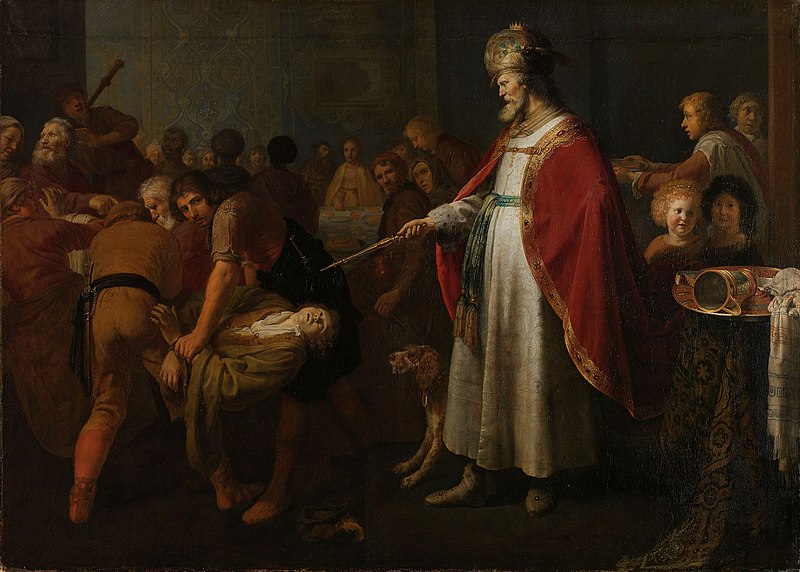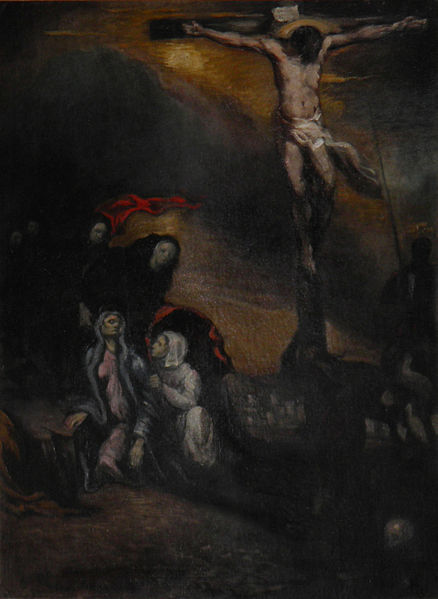Co-missioners,
Our gift today is a text study that was supposed to reach you two Sundays ago. It didn’t. It couldn’t. We sent you news on Tuesday of Lori Cornell’s battle with cancer. Lori had been editing our text studies for over twenty years. She had begun her usual work on the one below a few weeks ago and was unable to finish it.
The author of this study is Matthew DeLoera, a member of Lori’s writing team since 2017. When Jerry Burce, our Thursday Theology editor, scanned Matthew’s submission, he decided to publish it here with a few advance comments that might induce you to read it. Why the inducing? Because the study addresses a text that this year’s preachers have already handled or mangled, as the case be. It was read in churches this past Sunday.
Even so, says Jerry, read on. Why?
- Because it’s obvious that Matthew put lots of hours into this. Volunteer hours, no less. So if the laborer is not to be paid, then at least let him be read, to crib from Paul (1 Tim. 5:18).
- Because Matthew knows what he’s doing as he wrestles with this tough text. He provides a worthy example of what to do when faced with other tough texts, of which there are many. He digs deeply. He doesn’t flinch. He is honest about the thoughts and feelings that bubble up in mind and heart as he works through it—unhappy thoughts; rebellious feelings. He makes us face the haunting God-problem that others scramble to dodge or conceal. Truth is, we don’t love the Lord and God that the story’s king represents. He offends us. He scares us. We can’t help but judge him.
- And having made this plain, Matthew points us immediately to the Christ God sent to handle this problem of our estrangement from him. See Steps 4, 5 and 6 of the study. There you’ll find a model of how to tell the Gospel and put the benefits of Christ to use. If you listen closely, you might well catch echoes of things Fred Niedner underscored in the two-part essay we just finished sending you.
(Thus far Jerry.)
We close with what we know is an altogether unnecessary reminder. Keep Lori and her family in your prayers. Name others who wrestle with dark tides these days. God’s Jewish children have got to be in mind. God’s Palestinian children too. More on this next week, perhaps. In the meantime, and against all reason aside from Christ—
Peace and Joy,
The Crossings Community
__________________________________________________________________
Stunned but Not Speechless
A Six-Step Study of Matthew 22:1-14
by Matthew DeLoera
The Text (NRSV)
Once more Jesus spoke to them in parables, saying: 2“The kingdom of heaven may be compared to a king who gave a wedding banquet for his son. 3He sent his slaves to call those who had been invited to the wedding banquet, but they would not come. 4Again he sent other slaves, saying, ‘Tell those who have been invited: Look, I have prepared my dinner, my oxen and my fat calves have been slaughtered, and everything is ready; come to the wedding banquet.’ 5But they made light of it and went away, one to his farm, another to his business, 6while the rest seized his slaves, mistreated them, and killed them. 7The king was enraged. He sent his troops, destroyed those murderers, and burned their city. 8Then he said to his slaves, ‘The wedding is ready, but those invited were not worthy. 9Go therefore into the main streets, and invite everyone you find to the wedding banquet.’ 10Those slaves went out into the streets and gathered all whom they found, both good and bad; so the wedding hall was filled with guests.
11“But when the king came in to see the guests, he noticed a man there who was not wearing a wedding robe, 12and he said to him, ‘Friend, how did you get in here without a wedding robe?’ And he was speechless. 13Then the king said to the attendants, ‘Bind him hand and foot, and throw him into the outer darkness, where there will be weeping and gnashing of teeth.’ 14For many are called, but few are chosen.”

De gelijkenis van de onwaardige bruiloftsgast.
From Wikimedia Commons
Author’s Note
This parable seems absurd when read in isolation from its context. To indiscriminately usher (drag?) someone into the banquet, then be so offended by their lack of finery as to torture them, is repulsive and unacceptable. It’s hard to imagine that this king’s overblown offended-ness isn’t indicative of a track record that perhaps explains all the prior rejections of his invitations.
I think our only hope for making sense of the parable is to keep preceding verses in view. When doing that—see Step 3 below—it emerges that this parable of invitations is not really about invitation and certainly not about clothes (fun though it is to find fault with Jesus on that bit!). Instead, it’s an assessment of the priests and elders—capable of but failing to produce the “fruits of the kingdom” that Jesus demands.
DIAGNOSIS: Reflecting Little
Step 1: Initial Diagnosis (External Problem): Speechless
The king notices a banquet guest not wearing a wedding robe and commands his servants to bind and cast the underdressed offender into the outer darkness. We don’t know why he was underdressed, nor whether all the other guests managed to rate. We only know that the king’s gaze locked upon this particular guest. At first glance, the offense seems trivial, at least by our standards, which makes the king’s sudden rage seem all the more stunning. Certainly, the guest seems stunned—he is “speechless.” But regardless of how absurd it may be, this guest has been called out because the king expects everyone gathered to reflect his generosity—the fruit of election. He will not tolerate anything less, and this man is a grave violator.
Step 2: Advanced Diagnosis (Internal Problem): Muzzled
The king may not care about what led up to this moment, but we can imagine a few underlying reasons for the guest’s speechlessness. Perhaps he did not know the king’s rigid expectations—why should we assume he would?—and this hot news dumbfounds him. Or perhaps he knew but did not expect such anger from the king—shouldn’t the king be grateful after all those other folks rejected him?—and in the shock of discovering the custom has teeth, is consumed with regret. Then again, a chance guest indiscriminately whisked off the street may not have access to a wedding robe at all. So perhaps he feels indignant at being unjustly caught between a rock and a hard place, but at the same time “muzzled” by the power of a raging king (maybe even keeping his eyes cast downward, futilely hoping for a little mercy).
Step 3: Final Diagnosis (Eternal Problem): Bound
Of course, Jesus is not really talking about superficial appearances, but something deeper. This is but one of a series of parables that Jesus tells the angry priests and elders who confront him for driving vendors and moneychangers out of the temple (Matt 21:12-13), for shouts of “Hosanna” when he cures the blind and lame (Matt 21:14), and for teaching the people (Matt 21:23). Illustrating with these parables, Jesus condemns them on multiple counts, judging that “The Kingdom of God will be taken away from you and given to a people that produces the fruits of the kingdom” (Matt 21:43). As Jesus tells, “the kingdom of heaven may be compared to a king who gave a wedding banquet for his son” (Matt 22:2). And they have committed offenses much graver than underdressing—rejecting Jesus as the kingdom’s herald and even undermining the kingdom itself (“they wanted to arrest him”). They only reflect the hardness of their hearts.
Do our lives reflect any better “the kingdom of heaven come near?” (Matt 3:2) Perhaps like the underdressed guest, we did not realize the king’s rigid expectations (didn’t someone say “there is no one who is righteous, not even one?”), or knew but expected a pass (isn’t this God supposed to be slow to anger and abounding in steadfast love?), or perhaps even surrendered ourselves to modern life’s complications (caught between a rock and a hard place; try walking a mile in my shoes). But how is any of this fair? Look around! It’s not like we’re murderers or anything! Yet, in an unguarded moment we just can’t seem to account for what we have or have not done, finding ourselves exhausted of words and bound in the dark.

Crucifixion – Émile Bernard (1868–1941)
From Wikimedia Commons
PROGNOSIS: Bearing Much
Step 4: Initial Prognosis (Eternal Solution): En-robed
But wait a minute! The king may be throwing the banquet, but what about his son? After all, it’s all for HIM! Why hasn’t he shown up? Well, he did, but by a different route—the way of crucifixion. And there he wasn’t just underdressed. He was stripped bare of everything he had, even his own life, and he himself was cast into the outer darkness. Yet, he was raised in a resurrection more glorious than any wedding robe. And he comes bursting upon every rocky street, thorny wilderness, and into even the outermost darkness of this tired world to gather everyone he can find, both good and bad. When he finds us, and he always finds us, he draws us into his own body – the supreme banquet. Then, he robes us in his own righteousness, that we might belong to him forever, and weeping and gnashing of teeth will be no more.
Step 5: Advanced Prognosis (Internal Solution): En-peaced
And Jesus still isn’t done with us. By the power of the Spirit, he plants a faith in our hearts that notices the most uncomfortable things – like folks who seem underdressed – because it takes one to know one. And we’ve been there, likely having experienced all that this old world has to offer. We know its rigid expectations, how it heaps blame upon us when our own lives veer off course, how it persecutes us when we deviate or fail to give it what it wants, and especially how it casts us away when we find ourselves between the proverbial rock and hard place. Yet in Jesus, and we don’t really understand how, somehow, we sense a defiant peace that “surpasses all understanding” (Phil 4:7), because he does not give to us as the world gives.
Step 6: Final Prognosis (External Solution): En-speeched
Of course, the funny thing about faith is that even still, it doesn’t lead us out of the outer darkness. In fact, it does quite the opposite. It sends us further afield, because that’s where we’ll find a whole lot of other folks who would give anything for even just a shred of the peace that we’ve been given. And they don’t even have to ask for it. We can’t help ourselves but to speak it and bear it to them, along with all the fruit of the Spirit, of faith, and of election that hang on us like robes. And when they’re stunned to discover that that the same fruit now hangs on them, it might just leave them speechless. Or not.
Thursday Theology: that the benefits of Christ be put to use
A publication of the Crossings Community



You must be logged in to post a comment.